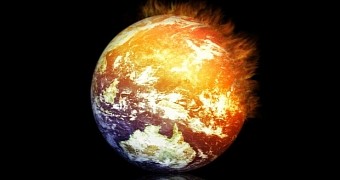Last year was the absolute hottest on record for our planet, scientists at the National Oceanic and Atmospheric Administration (NOAA, for short) in the US write in a report documenting recent shifts in Earth's climate.
The report, made public by the American Meteorological Society, confirms what researchers have been telling us for ages now: our planet is getting warmer and warmer, and a build-up of man-made greenhouse gas emissions in the atmosphere is the chief culprit.
Further, NOOA's State of the Climate in 2014 report shows that it's not just the continents and other patches of land scattered across the globe that are getting hotter. On the contrary, the world's oceans and seas are too warming up.
“Our climate is changing, not just in temperature, but from the depths of the oceans to the outer atmosphere,” NOAA specialist Thomas R. Karl explained in a statement, as cited by Science Daily.
The year 2014 was insanely hot
Having compiled and analyzed data provided by 413 scientists from 58 countries, NOAA researchers found that, in 2014, the average surface temperature documented on a global scale was 0.27 to 0.29 degrees Celsius (0.48 to 0.52 degrees Fahrenheit) higher than the 1981-2010 average.
Over land masses, climate specialists recorded an average temperature 0.37 to 0.44 degrees Celsius (0.66 to 0.79 degrees Fahrenheit) above the 1981-2010 average.
In Europe, over 20 countries experienced new record high temperatures, making 2014 the hottest on record for this continent. Most of Africa also struggled with above-average temperatures, and for Australia, last year turned out to be the third warmest on record.
As for sea and ocean surface temperatures, NOAA researchers say that the average recorded for 2014 was 0.21 to 0.27 degrees Celsius (0.37 to 0.48 degrees Fahrenheit) higher than the average documented for the period 1981-2010. Plainly put, Earth's seas and oceans are warming as well.
In their report, NOAA scientists detail that, in 2014, warmer- to much-warmer-than-average conditions were reported across most of the planet's oceans and especially in the North Pacific.
Earth's atmosphere is changing
Interestingly, these shifts in global temperatures correlate with a build-up of greenhouse gases such as carbon dioxide, methane and nitrous oxide in the planet's atmosphere.
For instance, NOAA researchers say that, in 2014, atmospheric concentrations of carbon dioxide upped by 1.9 ppm (parts per million) and reached a global average of 397.2 ppm. Back in 1990, the same average was one of just 354.0 ppm.
Specialists warn that, under a business-as-usual scenario, odds are climate change and global warming will continue to progress, meaning that our planet will get even hotter in the years to come.

 14 DAY TRIAL //
14 DAY TRIAL //